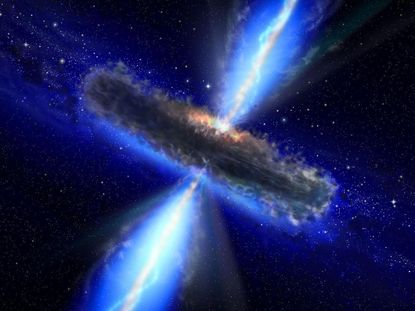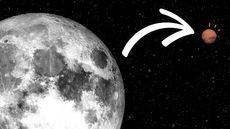Supermassive black hole ‘could hold answers to how the universe began’
Scientists say the discovery challenges current theories

Astronomers have discovered the most distant supermassive black hole in our universe - and it could change our understanding of how it all began.
The black hole - an area in space-time with immense gravitational effects that can absorb all matter and energy - was formed when the universe was only 5% of its current age, The Independent reports.
Scientists says our current understanding suggests that for a black hole of this magnitude to exist at such an early stage in the universe is theoretically impossible, the website reports.
Subscribe to The Week
Escape your echo chamber. Get the facts behind the news, plus analysis from multiple perspectives.

Sign up for The Week's Free Newsletters
From our morning news briefing to a weekly Good News Newsletter, get the best of The Week delivered directly to your inbox.
From our morning news briefing to a weekly Good News Newsletter, get the best of The Week delivered directly to your inbox.
What makes the discovery so significant, says Engadget, is that the matter surrounding the supermassive black hole formed “just hundreds of millions of years after the Big Bang”.
The researcher who led the team that made the discovery, Eduardo Banados, of the Carnegie Institute for Science, in Washington DC, told the website: “Gathering all this mass in fewer than 690 million years is an enormous challenge for theories of supermassive black hole growth.”
It also means that astronomers are observing an area of space-time that formed before stars or galaxies were born, the website says - a time we know very little about.
Although the universe is home to billions of planets and stars, scientists believe only 20 to 100 supermassive black holes exists, according to The Verge.
This can make the search for them “long and tedious”, the site says, but the hunt could lead to more answers about how the universe was formed.
Create an account with the same email registered to your subscription to unlock access.
Sign up for Today's Best Articles in your inbox
A free daily email with the biggest news stories of the day – and the best features from TheWeek.com
-
 'Make legal immigration a more plausible option'
'Make legal immigration a more plausible option'Instant Opinion Opinion, comment and editorials of the day
By Harold Maass, The Week US Published
-
 LA-to-Las Vegas high-speed rail line breaks ground
LA-to-Las Vegas high-speed rail line breaks groundSpeed Read The railway will be ready as soon as 2028
By Peter Weber, The Week US Published
-
 Israel's military intelligence chief resigns
Israel's military intelligence chief resignsSpeed Read Maj. Gen. Aharon Haliva is the first leader to quit for failing to prevent the Hamas attack in October
By Justin Klawans, The Week US Published
-
 Nasa reveals first findings from asteroid that could explain origins of life
Nasa reveals first findings from asteroid that could explain origins of lifeSpeed Read Sample from Bennu has been found to contain an abundance of water and carbon
By Jamie Timson, The Week UK Published
-
 How worried we should be about space debris
How worried we should be about space debrisfeature As part of a rocket washes up in Australia scientists warn ‘critical mass’ of orbital junk could only be decades away
By The Week Staff Published
-
 What is NASA's Artemis program?
What is NASA's Artemis program?Speed Read NASA's ambitious Artemis program will eventually create a base on the moon — and lay the foundations for manned missions to Mars
By Catherine Garcia Published
-
 SpaceX launches 1st all-civilian crew into orbit
SpaceX launches 1st all-civilian crew into orbitSpeed Read
By Catherine Garcia Published
-
 Is SpaceX's Inspiration4 really an inspiration?
Is SpaceX's Inspiration4 really an inspiration?Talking Point
By Jeva Lange Published
-
 Jeff Bezos' Promethean impulse
Jeff Bezos' Promethean impulseTalking Point
By Damon Linker Published
-
 The benefits of billionaires in space
The benefits of billionaires in spaceopinion This is how innovation begins
By James Pethokoukis Published
-
 How cybercriminals are hacking into the heart of the US economy
How cybercriminals are hacking into the heart of the US economySpeed Read Ransomware attacks have become a global epidemic, with more than $18.6bn paid in ransoms in 2020
By The Week Staff Last updated